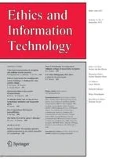Abstract
In the following essay, I will discuss D.Johnson's argument in her ETHICOMP99 KeynoteSpeech (Johnson 1999) regarding the possiblefuture disappearance of computer ethics as anautonomous discipline, and I will analyze somelikely objections to Johnson's view.In the future, there are two ways in whichcomputer ethics might disappear: (1) therejection of computer ethics as an aspect ofapplied ethics, or (2) the rejection ofcomputer ethics as an autonomous discipline.The first path, it seems to me, would lead tothe death of the entire field of appliedethics, while the second path would lead onlyto the death of computer ethics as a separatesubject. Computer technology is becoming very pervasive,and each scientific field includes somediscipline-specific computing. For the likelyforeseeable future, disciplines such asbioethics and engineering ethics will have todeal with ethical issues involving the role ofcomputers. I will argue that computer ethics inthis sense is unlikely to disappear, even ifcomputer ethics ceases to be considered as aseparate discipline.In order to understand which path will befollowed by computer ethics, I will compareJohnson's argument with ideas of earlierthinkers like N. Wiener (1950) and B. Russell(1932). Although Russell did not specificallyconsider computer technology, he had somegood intuitions about the development ofsocieties by means of technology.My conclusion will be two-fold: (1) thatapplied ethics will not die, but it may make nosense in the future to talk about computerethics as a separate field; and (2) thatcomputer ethics will not simply become``ordinary ethics'', contrary to Johnson's view.
Similar content being viewed by others
References
T.W. Bynum. The Foundation of Computer Ethics. Computer and Society, 30(2), June 2000 (cited as Bynum, 1999).
T.W. Bynum. Ethics and the Information Revolution. In G. Collste, editor, Ethics in the Age of Information Technology. Linköping, Centre for Applied Ethics, 2000a.
T. Dare. Applied Ethics, Challenges To. In R. Chadwick, editor, Encyclopedia of Applied Ethics, Volume I, pp. 183–190. Academic Press, San Diego, 1998.
F. Dyson. The Sun, the Genome, and the Internet. Oxford University Press, Oxford, 1999.
L. Floridi. Information Ethics: On the Philosophical Foundation of Computer Ethics. Ethics and Information Technology Journal, 1: 33–52, 1999.
B. Gert. Morality. Its Nature and Justification. Oxford University Press, Oxford, 1998.
K. Gorniak-Kocikowska. The Computer Revolution and the Problem of Global Ethics. In T.W. Bynum and S. Rogerson, editors, Global Information Ethics, pp. 177–190. Opragen, Guildford, 1996.
D. Gotterbarn. Computer Ethics: Responsibility Regained. In D. Johnson and H. Nissenbaum, editors, Computers, Ethics and Social Values, pp. 18–24. Prentice Hall, Upper Saddle River, 1995.
R.M. Hare. Ethics. In R.M. Hare, editor, Essays on the Moral Concepts, pp. 39–54. MacMillan, New York, 1972.
R.M. Hare. Why Do Applied Ethics?. In R.M. Hare, editor, Essays in Ethical Theory, pp. 1–13. Clarendon Press, Oxford, 1989.
J. Hospers. An Introduction to Philosophical Analysis. Routledge, London, 1997.
D. Johnson. Do Engineers have Social Responsibilities?. Journal of Applied Philosophy, 9: 21–34, 1992.
D. Johnson. Computer Ethics. Prentice-Hall, Upper Saddler River, 1994.
D. Johnson. Computer Ethics in the 21st Century. Keynote address delivers at the Ethicomp 99 International Conference on the Social and Ethical Impacts of Information Technologies. Rome, Luiss Guido Carli University, October 6-8, 1999.
M. Kaku. Visions. How Science Will Revolutionize the 21st century and Beyond. Oxford University Press, Oxford, 1998.
I. Kant, Fundamental Principles of the Metaphysics of Morals, translation by Thomas Kingsmill Abbott, http://www.swan.ac.uk/poli/texts/kant/kanta.htm, preface, orig. ed., 1785.
T. Kuhn. The Structure of Scientific Revolutions. University of Chicago Press, Chicago, 1970.
I. Lakatos. Mathematics, Science and Epistemology. Philosophical Papers Vol. II. Cambridge University Press, Cambridge, 1978.
A. MacIntyre. Does Applied Ethics Rest on a Mistake? The Monist, 67: 498–513, 1984.
A. Marturano. Bionics: A Link between Bioethics and Computer Ethics. In T.W. Bynum, J. van den Hoven, D. Gotterbarn and S. Rogerson, editors, Proceeding of Ethicomp 98. Rotterdam, Cict - Erasmus Universiteit, 1998.
D. McNaughton. Moral Vision. An Introduction to Ethics. Blackwell, Oxford, 1988.
J. Moore. What Is Computer Ethics?. In T.W. Bynum, editor, Computers and Ethics, pp. 266–275. Blackwell, London, 1985.
J. Rifkin. The Biotech Century: Harnessing the Gene and Remaking the World, J P Tarcher/Putnam, New York, 1998.
B. Russell. The Scientific Outlook. Allen & Unwin, London, 1931.
B. Russell. History of Western Philosophy. Allen & Unwin, London, 1946.
S. Toulmin. The Tyranny of Principles. The Hastings Center Report, 11(6): 31–38, 1981.
P. Virilio. La Bombe Informatique. Éditions Galileé, Paris, 1999.
N. Wiener. The Human Use of Human Beings. Houghton Mifflin, Boston, 1950.
N. Wiener. Invention: The Care and Feedings of Ideas. MIT Press, Boston, 1993 (1954).
Author information
Authors and Affiliations
Rights and permissions
About this article
Cite this article
Marturano, A. The role of metaethics and the future of computer ethics. Ethics and Information Technology 4, 71–78 (2002). https://doi.org/10.1023/A:1015202319899
Issue Date:
DOI: https://doi.org/10.1023/A:1015202319899




